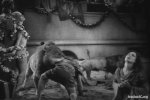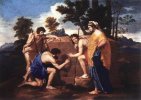-
Sign up or login, and you'll have full access to opportunities of forum.
You are using an out of date browser. It may not display this or other websites correctly.
You should upgrade or use an alternative browser.
You should upgrade or use an alternative browser.
The Fate of a Goth Girl
- Thread starter Praefectus Praetorio
- Start date

Fossy
SEXPIOGENTUS
Now that the globally in-demand actress Dame Barb Moore has been released from the wrath of the Romans maybe we really should consider this remake ...Well, Cecil did promise to make me a star if I agreed to the nudity clause in my contract for this epic. Not sure I remember agreeing to the nails, though … or of having to share billing with that fatso who plays Galerius. Last time I’ll ever agree to employ T.H.Tree Casting as my agent.
When this is over, I’m going to shoot for the title role in the remake of Gone with the Wind. I understand it’s going to be shot on location in Arkansas and be directed by Fossy. And after that perhaps a remake of Braveheart under the direction of Montycrusto, or Mutiny on the Bounty under the direction of Twonines.

NOTE ... Mr Gable appearing by virtue of the latest hologram technology.

Well, for this role I’ll need to work on my Southern Belle accent and gentile mannerisms: “Well Clark, Ahh do declare your … uhhh … haahd little thingy … is ahhh makin maah little haahrt go ahhhl pity patter. Don’t yah just stand thar now … Fuck me!”Now that the globally in-demand actress Dame Barb Moore has been released from the wrath of the Romans maybe we really should consider this remake ...
NOTE ... Mr Gable appearing by virtue of the latest hologram technology.
View attachment 1016949
twonines
LIMERICUS
Frankly, my dear----------Well, for this role I’ll need to work on my Southern Belle accent and gentile mannerisms: “Well Clark, Ahh do declare your … uhhh … haahd little thingy … is ahhh makin maah little haahrt go ahhhl pity patter. Don’t yah just stand thar now … Fuck me!”
twonines
LIMERICUS
Is that because you are seen as a renewable resource?Hmmmm … don’t believe I have … I’ve been just about everything imaginable here on CF but that.
Crux-Emperor Baracus X
Rectidolor
Brilliant story Pr Pr. Well done.... 



carloscruz
Governor
Thanks a lot for the answer!All those images are from the 1932 American pre-Code epic film "The Sign of the Cross," produced and directed by Cecil B. DeMille. based on the original 1895 play by English playwright Wilson Barrett. It stars Fredric March, Elissa Landi, Claudette Colbert, and Charles Laughton, with Ian Keith and Arthur Hohl.
View attachment 1016871
carloscruz
Governor
As always Barb on the criss os magnificent!!
Thank you!!!
Thank you!!!
carloscruz
Governor
I liked a lot the eroticism and almost ingenuity of the image. The maid about to be sacrificed naked, the flowers...All those images are from the 1932 American pre-Code epic film "The Sign of the Cross," produced and directed by Cecil B. DeMille. based on the original 1895 play by English playwright Wilson Barrett. It stars Fredric March, Elissa Landi, Claudette Colbert, and Charles Laughton, with Ian Keith and Arthur Hohl.
View attachment 1016871
SonI looked a little for more images.
Here you have them, perhaps you would enjoy as much as me.
Attachments
-
 3B564B60-4E66-49BB-B6C4-11E1ABC5EF72.jpeg114.2 KB · Views: 140
3B564B60-4E66-49BB-B6C4-11E1ABC5EF72.jpeg114.2 KB · Views: 140 -
 FEC025CE-22CD-4293-A42C-F19E6AF6A653.jpeg66.3 KB · Views: 146
FEC025CE-22CD-4293-A42C-F19E6AF6A653.jpeg66.3 KB · Views: 146 -
 CB9518EE-C6A8-4732-8289-97C1F5F92CF0.jpeg84.2 KB · Views: 139
CB9518EE-C6A8-4732-8289-97C1F5F92CF0.jpeg84.2 KB · Views: 139 -
 B3628DC3-2455-4204-956A-467CCE598CF5.jpeg65.1 KB · Views: 139
B3628DC3-2455-4204-956A-467CCE598CF5.jpeg65.1 KB · Views: 139 -
 3B54983F-4870-4E6F-9DE8-CED3BAC11F94.jpeg40.7 KB · Views: 161
3B54983F-4870-4E6F-9DE8-CED3BAC11F94.jpeg40.7 KB · Views: 161
carloscruz
Governor
Loinclothslave
slave to the whip
@Praefectus Praetorio
Well, what can I say, that I haven’t already said In Terms of praise? At the risk of repeating myself, thank you once more for a wonderful tale! I really enjoy the old fashioned cliffhanger serial style you often employ. The brilliant use of scenarios to create hope even when hope is all but lost? The question of if she could possibly survive if taken off the cross even at the last intoxicated me with delicious possibility!
I think I stayed for the torture of the sack firstly, but by that point you’d fully sucked me in- I was invested in these characters and wanted all the gory details - of which there were many and for which I thank you!
Of course, the final chapter confirmed her doom, but even as she breathes her last - unable to tear her wrists for that one last sip of air, you pull another rabbit out of the hat with a truly tender reconciliation with her father.
Like his Governor father I also was relieved that pig Galerius wasn’t present for that.
—————————————
So many segues occurred to me during the story. Two I recall today are:
1. imagining Galerius being so embarrassed that he does something about it. In an effort to be a better son but also being a selfish sadist, Galerius decides to become a far better torturer. He exercises and buys cheap slaves to practice his whipping style upon, gradually losing some flab and strengthening his upper body such that he eventually can whip his slave to death.. Like Jenny Craig for sadistic spoiled Romans!
2. Taking the idea that Barb could be taken off the cross so late, and healing her enough to survive.. but what to do with her then? There’s only one option as I see it, slavery... delicious degrading slavery for this proud woman would indeed be a fate worse than dying on the cross that afternoon.... And who would own her? Would it still be that fat fool Galerius? Or does the slave dealer buy her back in order to fetch a good sale price or even because he wants her for himself?
Because she’s defiant, it wouldn’t be an easy life at all. We know Barb wouldn’t passively accept this mercy. And so it would be hard. Maybe her stigmata would become convenient mounting points for her chains? And what of her father? He tried to kill an important Roman Citizen! He would surely have to join her in enslavement.
———————
So you’ve inspired me! I’m hoping to utilise these segue ideas and write a couple of vignettes of my own in tribute. I’ll ask both you and @Barbaria1 if I may use such established characters or if either of you prefers I use differently named ones with similar (invented) backgrounds to use in my vignettes... And I’ll take my time writing them. Not in your style, I’m not that good a chameleon and I’m sure would only come off as a poor saccharine-like substitute , but in my own developing style...
Thank you for a wonderful tale.
LCs
Well, what can I say, that I haven’t already said In Terms of praise? At the risk of repeating myself, thank you once more for a wonderful tale! I really enjoy the old fashioned cliffhanger serial style you often employ. The brilliant use of scenarios to create hope even when hope is all but lost? The question of if she could possibly survive if taken off the cross even at the last intoxicated me with delicious possibility!
I think I stayed for the torture of the sack firstly, but by that point you’d fully sucked me in- I was invested in these characters and wanted all the gory details - of which there were many and for which I thank you!
Of course, the final chapter confirmed her doom, but even as she breathes her last - unable to tear her wrists for that one last sip of air, you pull another rabbit out of the hat with a truly tender reconciliation with her father.
Like his Governor father I also was relieved that pig Galerius wasn’t present for that.
—————————————
So many segues occurred to me during the story. Two I recall today are:
1. imagining Galerius being so embarrassed that he does something about it. In an effort to be a better son but also being a selfish sadist, Galerius decides to become a far better torturer. He exercises and buys cheap slaves to practice his whipping style upon, gradually losing some flab and strengthening his upper body such that he eventually can whip his slave to death.. Like Jenny Craig for sadistic spoiled Romans!
2. Taking the idea that Barb could be taken off the cross so late, and healing her enough to survive.. but what to do with her then? There’s only one option as I see it, slavery... delicious degrading slavery for this proud woman would indeed be a fate worse than dying on the cross that afternoon.... And who would own her? Would it still be that fat fool Galerius? Or does the slave dealer buy her back in order to fetch a good sale price or even because he wants her for himself?
Because she’s defiant, it wouldn’t be an easy life at all. We know Barb wouldn’t passively accept this mercy. And so it would be hard. Maybe her stigmata would become convenient mounting points for her chains? And what of her father? He tried to kill an important Roman Citizen! He would surely have to join her in enslavement.
———————
So you’ve inspired me! I’m hoping to utilise these segue ideas and write a couple of vignettes of my own in tribute. I’ll ask both you and @Barbaria1 if I may use such established characters or if either of you prefers I use differently named ones with similar (invented) backgrounds to use in my vignettes... And I’ll take my time writing them. Not in your style, I’m not that good a chameleon and I’m sure would only come off as a poor saccharine-like substitute , but in my own developing style...
Thank you for a wonderful tale.
LCs
Last edited:
Fine by me.I’ll ask both you and @Barbaria1 if I may use such established characters
Praefectus Praetorio
R.I.P. Brother of the Quill
If it's OK with the characters, it's OK with me. But, watch out! Some of them have rather greedy agents. After having achieved fame in this production, they may ask for exorbitant salaries for another story. And one complains so much she is an unbearable pain to work with - despite her very fetching appearance. I would recommend not using her any moore.I’ll ask both you and @Barbaria1 if I may use such established characters
NewUser
Magistrate
I didn't think you had such a bad opinion of that bitch. About Galerius.And one complains so much she is an unbearable pain to work with - despite her very fetching appearance. I would recommend not using her any moore.

Praefectus Praetorio
R.I.P. Brother of the Quill
You try working with her day after day!I didn't think you had such a bad opinion of that bitch. About Galerius.

Epilog
Governor Antonious received the obligatory thanks of his few remainer guests as they departed. All were surprisingly subdued, not just because of the long afternoon and the late hour. No one mentioned what they had spent six hours watching.
As the last few stragglers of the former crowd left the amphitheater, the Governor and Centurion had a quiet talk. They agree that a punitive expedition against the Goth village was now unnecessary. Reflection had convinced both that the raid had been unorganized and most of the hotheads had been killed. Friþugairns also seemed to pose no threat. The Praeses was as anxious as ever to maintain peace with the Goths.
They agreed that the chief’s daughter's body would be taken respectfully down from the cross and stored appropriately overnight. Then, in the morning, soldiers would help load her on the leader's small mule cart and escort him taking her home. The Tesserarius would be assigned the task since he seemed to connect mutual respect with the old man.
The following day, as the small mournful procession exited the Porta Aquitania, life in Narbo seemed to return to normal. The various actors in our minor drama resumed their diurnal habits and duties as if nothing remarkable had happened. Although few of the participants ever again referred to the events of the last several days, several were more deeply affected than they would admit.
Praeses Antonious was greatly embarrassed by the various events precipitated by his spoiled son. He resolved to whip his son into shape. Galerius was put on a forced diet and a rigorous exercise program. The father assigned two of his most trusted servants to oversee the program. They were even permitted to beat the lad if he failed to follow the program (something Galerius bitterly resented – far more than any pain caused).
Gaius himself now devoted much personal time to instruct his son in the affairs of government. Finally, after almost a year, Galerius had lost significant weight and seemed to take his lessons to heart. The Governor was gratified that his only child might become a productive member of the ruling class.
In May of 384, the Praeses sent his son with some messages for the Vicarius in Tolosa, North West of Narbo, on the Via Aquitania. Gaius assigned a large and battle-experienced servant for aid and protection on their journey. They left Narbo by the Porta Aquitania and traveled out through the rolling farm fields on that side of the provincial capital. Then Galerius's still arrogant nature reared its ugly head. The lad had required a fine big horse for the trip but only allowed the servant a somewhat decrepit mule. As they left the city and began the journey through the gently rolling farm fields surrounding Narbo, Galerius immediately complained about the servant being slow and lazy. The man tried to hurry his mule, but the poor creature was not capable of much speed. Finally, after an hour of ambling progress, Galerius lost his temper and rashly spurred his horse forward into the old-growth oak forest that marked the end of the Roman fields and the beginning of the more sparsely settled regions beyond, now partially inhabited by Goths.
The servant hurried along as best he could but was unable to catch his master. An hour later, emerging from the dense forest, he saw Galerius's horse, peacefully eating grass by the side of the road. But the Governor's son was nowhere to be seen.
After a brief search, the man returned to Narbo with the news. Centurion Calixtus organized a thorough search, but no evidence was ever found to tell what had happened.
Galerius’s fate was forever unknown.
Epilog to be continued
Last edited:
M
montycrusto
Guest
Another case for CSI Narbonensis... thanks for the Epilogue, glad SOMEONE got what they deservedCenturion Calixtus organized a thorough search, but no evidence was ever found to tell what had happened.
Galerius’s fate was unknown.

NewUser
Magistrate
Centurion Calixtus organized a thorough search, but no evidence was ever found to tell what had happened.
Galerius’s fate was forever unknown.
And for me, this is how I see it: the Centurion found this Roman slut, killed him, and got rid of the evidence burying the body in the woodsAnother case for CSI Narbonensis... thanks for the Epilogue, glad SOMEONE got what they deserved

M
montycrusto
Guest
(my Kopfkino runs on a little bit further)
A couple of years later, Gaius, tormented by guilt over the death of his feckless son, pays for a memorial to be erected at the site where Galerius was last seen alive.

The stone slab bears the enigmatic legend "Et In Arcadia Ego", and becomes the subject of Nicholas Poussin's "Les Bergers D'Arcadie" painted around 1640, now in the Musee du Louvre, Paris.

In the painting, we see three shepherds and a shepherdess pondering the fate of the nameless Roman commemorated by the memorial stone... wondering what kind of legendary hero he might have been, and what great feats of daring and masculine prowess he might have achieved in his lifetime.
A couple of years later, Gaius, tormented by guilt over the death of his feckless son, pays for a memorial to be erected at the site where Galerius was last seen alive.

The stone slab bears the enigmatic legend "Et In Arcadia Ego", and becomes the subject of Nicholas Poussin's "Les Bergers D'Arcadie" painted around 1640, now in the Musee du Louvre, Paris.

In the painting, we see three shepherds and a shepherdess pondering the fate of the nameless Roman commemorated by the memorial stone... wondering what kind of legendary hero he might have been, and what great feats of daring and masculine prowess he might have achieved in his lifetime.
Last edited by a moderator:
Herein lies the seed for the story of the Headless Horseman of Sleepy Hollow? Nah. Just coincidence, right?The servant hurried along as best he could but was unable to catch his master. An hour later, emerging from the dense forest, he saw Galerius's horse, peacefully eating grass by the side of the road. But the Governor's son was nowhere to be seen.
After a brief search, the man returned to Narbo with the news.
Fossy
SEXPIOGENTUS
"... Galerius’s fate was forever unknown ..." - I love a happy endingYou try working with her day after day!
Epilog
Governor Antonious received the obligatory thanks of his few remainer guests as they departed. All were surprisingly subdued, not just because of the long afternoon and the late hour. No one mentioned what they had spent six hours watching.
As the last few stragglers of the former crowd left the amphitheater, the Governor and Centurion had a quiet talk. They agree that a punitive expedition against the Goth village was now unnecessary. Reflection had convinced both that the raid had been unorganized and most of the hotheads had been killed. Friþugairns also seemed to pose no threat. The Praeses was as anxious as ever to maintain peace with the Goths.
They agreed that the chief’s daughter's body would be taken respectfully down from the cross and stored appropriately overnight. Then, in the morning, soldiers would help load her on the leader's small mule cart and escort him taking her home. The Tesserarius would be assigned the task since he seemed to connect mutual respect with the old man.
The following day, as the small mournful procession exited the Porta Aquitania, life in Narbo seemed to return to normal. The various actors in our minor drama resumed their diurnal habits and duties as if nothing remarkable had happened. Although few of the participants ever again referred to the events of the last several days, several were more deeply affected than they would admit.
Praeses Antonious was greatly embarrassed by the various events precipitated by his spoiled son. He resolved to whip his son into shape. Galerius was put on a forced diet and a rigorous exercise program. The father assigned two of his most trusted servants to oversee the program. They were even permitted to beat the lad if he failed to follow the program (something Galerius bitterly resented – far more than any pain caused).
Gaius himself now devoted much personal time to instruct his son in the affairs of government. Finally, after almost a year, Galerius had lost significant weight and seemed to take his lessons to heart. The Governor was gratified that his only child might become a productive member of the ruling class.
In May of 384, the Praeses sent his son with some messages for the Vicarius in Tolosa, North West of Narbo, on the Via Aquitania. Gaius assigned a large and battle-experienced servant for aid and protection on their journey. They left Narbo by the Porta Aquitania and traveled out through the rolling farm fields on that side of the provincial capital. Then Galerius's still arrogant nature reared its ugly head. The lad had required a fine big horse for the trip but only allowed the servant a somewhat decrepit mule. As they left the city and began the journey through the gently rolling farm fields surrounding Narbo, Galerius immediately complained about the servant being slow and lazy. The man tried to hurry his mule, but the poor creature was not capable of much speed. Finally, after an hour of ambling progress, Galerius lost his temper and rashly spurred his horse forward into the old-growth oak forest that marked the end of the Roman fields and the beginning of the more sparsely settled regions beyond, now partially inhabited by Goths.
The servant hurried along as best he could but was unable to catch his master. An hour later, emerging from the dense forest, he saw Galerius's horse, peacefully eating grass by the side of the road. But the Governor's son was nowhere to be seen.
After a brief search, the man returned to Narbo with the news. Centurion Calixtus organized a thorough search, but no evidence was ever found to tell what had happened.
Galerius’s fate was forever unknown.
Epilog to be continued



